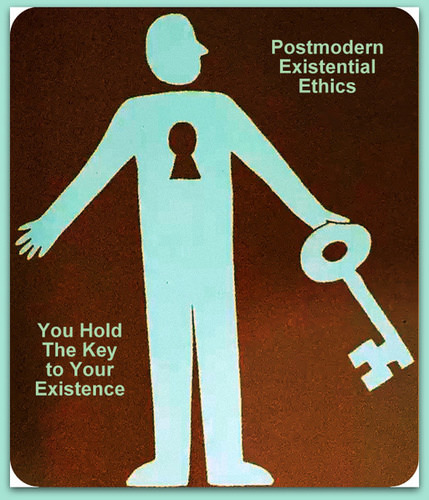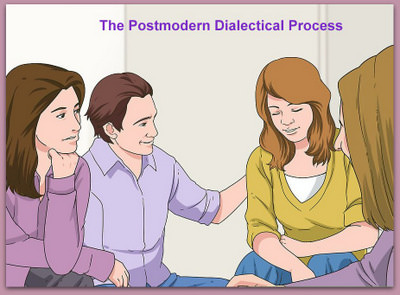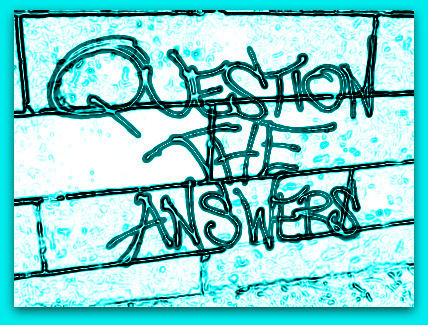8.7 后现代道德在现实主义、实用主义、女权主义和对话进程中的现代道德
章节大纲
-
Post Modern Ethics
::后现代道德During the Twentieth Century the advanced technological societies of the West and some in the East experienced a decline in the number of people who practiced their religion regularly and accepted a morality based upon Natural Law Theory .
::二十世纪期间,西方和一些东方先进技术社会经常信奉其宗教并接受基于自然法理论的道德的人减少。There was a decline in the belief that:
::认为:-
There is a single reality and that humans can have knowledge of it.
::只有一个现实,人类可以了解它。 -
There is objective truth
::有客观的真相 -
There are absolutes
::绝对数是绝对数
This decline can be attributed to a number of factors:
::这一下降可归因于若干因素:-
The increase in information about other cultures and their various practices, beliefs and values
::有关其他文化及其各种习俗、信仰和价值观的信息增加 -
Advances in what science and technology could provide for humans in improvements in their basic living along with an appreciation for material goods
::科学技术在改善人类基本生活方面可以给人类带来哪些进步,同时对物质商品表示赞赏 -
The spreading influence of ideas from the existentialist and pragmatist movements
::存在主义和实用主义运动思想的传播影响 -
The spread of democratic ideals
::民主理想的传播
In the Post Modern view there are no absolutes of any kind and there are no universal truths nor universal criteria for beauty and nor are there universal principles of the Good. Thus, there is a return of relativism in the sphere of morality. With that return there is also the threat of chaos which relativism spawns . As reaction to this trend there is an increase in the numbers of people returning to religion and religious principles as the foundation for their moral lives. The fastest growing religion in the world is Islam. Islam is increasing in its population through a birth rate higher than average and through conversions. Islam fundamentalism is growing in the number of adherents . Fundamentalists of Islam and of Christianity and Judaism are all declaring their condemnation of the current state of moral decline and the rise of relativism and materialism.
::在《现代邮报》的观点中,没有任何绝对的绝对性,没有普世真理,没有普世的美貌标准,也没有普世的美德标准,也没有普世的善德原则。因此,在道德领域又出现了相对主义的回归。在这种回归之后,还出现了相对主义引发的混乱威胁。作为对这一趋势的反应,越来越多的人回到宗教和宗教原则,以此作为其道德生活的基础。世界上增长最快的宗教是伊斯兰教。伊斯兰教正在通过高于平均水平的出生率和改变信仰来增加其人口。伊斯兰教原教旨主义正在增加信徒的数量。伊斯兰教、基督教和犹太教的原教原教旨主义者都在宣布谴责目前的道德衰落和相对主义和物质主义的抬头。In moral theory there has developed a number of traditions that extol alternatives to the teleological and deontological approaches based upon reason and the belief that universal principles can be reached through the exercise of reason.
::在道德理论方面,已经发展了一些传统,这些传统基于理性和通过运用理性可以实现普遍原则的信念,赞美了用其他方法替代神学和神学方法。-
The Existentialists
called for an acceptance of the inescapable role of human emotions.
::存在论者呼吁接受人类情感不可逃避的作用。 -
The Pragmatists
focused on the impossibility of reason reaching beyond the frailties of limitations of human reason.
::实用主义者的焦点是,理智不可能超越人类理性限制的弱点。 -
The Feminist
theoreticians have devised a number of approaches to ethics that have at least this much in common; the denial of previous theories as being biased and deluded.
::女权主义理论家已经设计了一些处理伦理问题的方法,这些方法至少有这些共同点;否认先前的理论是有偏见和欺骗的。
Post Modern Existential Ethics
::现代后存在伦理道德Nietzsche’s ethical principle of the will to power makes a claim to the egoistic nature of humanity. The doctrine asserts that all humans strive to forcibly impose their will upon others as a primal drive in their nature compels them to do so. Man will relentlessly exercise his will over others as an example of his determination, spirit, and strength of character. To demonstrate and acquire his power and influence is his inherent motivation to act, even if his actions essentially seem unselfishly provoked. Nietzsche alleges that no true altruistic deeds exist because humans are wholly egocentric and self-seeking by nature. We may give the impression that we are considerate, caring, and selfless as we may perform kind deeds for others that regard us as humane, but our innate intentions are truly self-absorbed and do not entail goodness or benevolence By this, Nietzsche does not suggest by any means that mankind is innately malicious out of its deceptive intentions, but rather that it is more rapt in its own aspirations or purposes of life These aspirations are to be esteemed as an example of human prominence and not mistaken for the malice and deterioration of mankind.
::尼茨切关于权力意志的道德原则主张人类的自我主义性质。该学说声称,所有的人努力将自己的意志强行强加于他人,作为本性上的一种原始动力,迫使他们这样做。人将无情地行使自己的意志,作为他意志、精神和性力的榜样。表明和获得他的权力和影响力是其采取行动的内在动机,即使他的行为基本上看起来似乎是不自利的挑衅。尼茨切声称,不存在真正的利他主义行为,因为人类是完全的自我中心,是自然的自我追求。我们可以给人一个印象,我们是在思考、关心和无私,因为我们可能为认为我们是人道的其他人做善事,但我们的本意是真正的自我容忍的,不会因此而带来善良或愤慨。 尼采没有以任何手段暗示人类天生的恶意是出于其欺骗性的意图,而是在自己的愿望或生命目的上更加狂妄自取非一成一成不变。 这些愿望是人类的典型和错误的。Conversely , sympathy, generosity, and equality are all qualities that one associates with good moral character, not with contemptibility as Nietzsche does. The noble spirit that Nietzsche speaks of would not embrace these traditional ethical traits. To manipulate characters of fragility and frailty , to indulge in one’s supremacy, and to pamper one’s self with praise, are preferably what Nietzsche considers to be the intrinsic and admirable traits of the good. Traditional ethicists revile these characteristics and see them as they may prompt the decaying of civilization. Nevertheless, Nietzsche merely suggests that it is instinctive of humans to inflict their will to power. Analogously, the Darwinist Theory of Evolution verifies such a claim as it is the survival of the fittest that determines what species endures and what species ceases to exist. The fittest in accordance to Nietzsche’s ethical principles are the good and those who strive to dominate over inferior beings. Perhaps this is precisely why many conventional ethicists would refute Nietzsche’s will to power. It is evident that the fundamental institution of morals into society is to impede many of our natural propensities in order to avert the chaotic unruliness that may arise from them.
::反之,同情、慷慨和平等都是道德品质优美的品质,而不是尼采(Nietzsche)那样的轻蔑。尼采(Nietzsche)所讲的崇高精神不会接受这些传统的伦理特征。 操纵脆弱和脆弱人物,沉溺于一个人的至高无上,赞美他人的自我,最好是尼采认为是善良的内在和令人钦佩的特质。传统伦理学家对这些特征产生反感,认为这些特征可能引发文明的衰败。 尽管如此,尼采(Nietzsche)只是表明人类本能决定他们的权力意志。 类似地说,达尔文主义的进化理论证实了这种主张,因为它是决定物种生存和物种消失的适量。 尼采的道德原则是善良和那些试图主宰劣等生命的人。 也许这正是许多传统伦理学家会驳斥尼采(Nietzche)对权力的本能。 显然,道德的本能性会阻碍我们自然社会的许多基本道德秩序。Nietzsche distinguishes between noble (masters) and base (slaves) souls. The concept of a noble soul originates from Nietzsche’s admiration of ancient Greek culture. The ancient Greeks were an animated people who paradoxically welcomed the inevitability of death, facing the ordeals and hardships of life, whilst celebrating its magnificence. The noble soul or master, according to Nietzsche, is a replica of the ancient Greek. He grows comfortably amidst the suffering and toils of human pain as he confronts life. This confrontation is natural and only drives him to grow and acquire more. He may have to exploit the base soul for his own good, but this maltreatment of another being only supplements his pride and his will to power. In this sense, affliction provides the master with the prospect of extensive growth, and does not hinder his path to power.
::涅茨谢将贵族和贱民的灵魂区分开来。贵族灵魂的概念源自涅茨谢对古希腊文化的钦佩。古希腊人是一个动人的民族,他们自相矛盾地欢迎死亡的必然性,面对着痛苦和生活困苦,同时庆贺着生命的宏大。根据涅茨谢的说法,崇高的灵魂或主人是古希腊的复制品。他在面对生命时,在痛苦和人类痛苦的苦痛中成长得非常舒适。这种对抗是自然的,只会促使他成长和获得更多。他可能不得不为了自身的利益而利用基地的灵魂,但是对他人的这种虐待只是补充他的骄傲和权力意志。 从这个意义上讲,痛苦为主人提供了广泛的成长前景,并且不会阻碍他走上权力之路。On the contrary, the base spirit or slave trembles in the face of affliction. He does not challenge the hardships of life, but rather seeks to assuage the pain which he finds intolerable. Such a being seeks out consolation from others out of his apprehension and despicability . He considers sympathy, benevolence, and equality to be the essential attributes of goodness because they falsely detract from the injustice and agony of life. The slaves are inferior to the master in that they do not anticipate growing in a torturous, pain-inflicted world. Nietzsche considers this base soul to represent the greater part of humanity today. Thus, his ethical principle of the noble’s will to power over the base epitomizes a complete avant-garde reversal of the nature of bad and good in traditional ethical thought.
::恰恰相反,基本精神或奴隶在痛苦面前颤抖。他没有挑战生活困苦,而是试图减轻他所感到的无法忍受的痛苦。这种精神从他的恐惧和堕落中寻求他人的安慰。他认为同情、仁慈和平等是善良的基本属性,因为它们错误地贬低了生活的不公正和痛苦。奴隶比主人低劣,因为他们没有预料到在一个残酷、痛苦和痛苦的世界里成长。尼采认为这个基本灵魂代表了当今人类的更大部分。因此,他高贵对基础掌权的意愿的道德原则体现了传统道德思想中坏和善的性质的彻底颠倒。Nietzsche: The Good Life
::涅采:美好生活Read
::已读
EPISD Informed Problem Solvers Goal
::EPISD 信息化解决问题者目标Does Christianity Make Us Weak
::基督教是否使我们弱化Nietzsche submits this idea of morality to radical critique. He believes both that the idea is philosophically insupportable and that when we understand its genealogy, we will see that what actually explains our having it are profoundly negative aspects of human life. Morality is an ideology. We can believe it only if we ignore why we do. Central to Nietzsche’s thought is a fundamental distinction between the ideas of good and bad, on the one hand, and those of (moral) good and evil, on the other. The natural form ethical evaluation first takes, he believes is that of excellence or merit. People who excel, who have merits we admire and esteem, thereby have a kind of natural nobility.
::涅茨谢将道德理念归结为极端批评。 他认为,这个理念在哲学上是站不住脚的,当我们理解其基因学时,我们会发现,真正解释我们拥有它的真正原因就是人类生活的深刻负面方面。 道德是一种意识形态。 只有当我们忽视我们这样做的原因时,我们才能相信它。 涅茨谢的核心思想是将善恶理念与(道德)善恶理念从根本上区分开来。 自然形式的道德评估首先表现为优异或优异。 优秀的人,我们钦佩和敬重他们,因此他们拥有一种自然的贵族精神。These are:
::它们是:-
rank-ordering
::一级一级排列 -
rank-defining
value judgments
::定级值判断
We naturally look up to, we respect and esteem, those with merit. He calls them “knightly aristocratic values.”
::我们自然而然地仰慕、尊重和尊敬那些有功的人,他称他们为“每晚的贵族价值观”。-
The “primary” half of the pair is good. Bad is what is not--good. What is not worthy of esteem and respect.
::“第一”一半是好的,坏的是不好的,不值得尊敬和尊重的。 -
The “good” features are naturally “positive”; they affirm and sustain life, vigor, strength, etc., e.g. openness, cheerfulness, creativity, physical strength, agility, grace, beauty, vigor, health, wit, intelligence, charm, and friendliness.
::“良好”特征自然是“积极的”;它们肯定并维持生命、活力、力量等,例如开放、欢乐、创造力、体力、灵活性、优雅、美丽、活力、健康、智慧、智慧、智慧、魅力和友善。
On the other hand, the “primary” half of the good/evil pair is evil. The idea of evil is reactive . It comes from the negation of good. Indeed, Nietzsche believes that it derives from negating good (natural merit). And the idea of moral good is simply the negation of that negation. It is what is not evil. The original negation is due to resentment—a psychological process through which the naturally weak suppress their anger at being slighted by the strong who consider them of little merit. Unable to express their anger honestly, they suppress it to an unconscious level, in the “dark workshop” of the human psyche. It then comes to be expressed not as personal anger, but in an alienated, impersonal form, namely, as moral indignation and resentment. The strong who disrespect the weak are seen, by virtue of their disrespect, as deserving moral disapproval—as being evil.
::另一方面,善恶的“第一”是邪恶的,邪恶的观念是消极的,是被动的,是消极的,是否定善良的。事实上,尼采认为道德的理念是否定善良的(自然的优点),道德的理念只是否定否定正义,它不是邪恶的,最初的否定是由于怨恨——一种心理过程,自然的弱者通过这个过程抑制他们的愤怒,被那些认为自己功绩不大的强者轻视;不能诚实地表达他们的愤怒,在人类精神的“邪恶工作坊”中将愤怒压到昏迷的地步;然后,道德的愤怒和怨恨不是表现为个人的愤怒,而是排外的、非人的形式,即道德的愤慨和怨恨,不尊重弱者的强者因其不尊重而被视为应受道德谴责的邪恶。We can see how this process is supposed to work in Nietzsche’s parable of the lambs and the birds of prey. The birds see the lambs as their natural inferiors, as meat. The lambs are angered by this, but can’t do anything about it directly by expressing personal anger. So they express their anger in an impersonal way. They reproach the birds; they hold them morally responsible for what they lambs see as their evil conduct. They project the ideology of morality, which is just the impersonal expression of their personal anger and hatred. Nietzsche is saying that morality is born in denial.
::我们可以看到在尼采的羊群和猎物鸟群的比喻中,这一过程应该如何运作。鸟儿认为羊群是天生的下等人,是肉类。 羊群对此感到愤怒,但不能直接表达个人愤怒。 因此他们以非人的方式表达愤怒。 他们责备鸟群,认为鸟群对羊群的邪恶行为负有道德责任。 他们展示道德意识形态,这仅仅是他们个人愤怒和仇恨的不人格表现。 尼采说道德是自相矛盾的。The problem from Nietzsche’s perspective is that, unlike the birds of prey, the naturally strong have been taken in by this ideology. Through Judeo-Christian religion, a “priestly caste” has taken over culture to such a degree that the ideology of morality is now the dominant view. But in addition to being born in hatred and denial, Nietzsche believes both that the idea of morality is philosophically insupportable (for example, in its assumption of free will) as well as one that has terrible consequences for human culture—it is an ethic of weakness and illness that chokes off genuine human achievement.
::从尼采的观点看,问题在于,与猎物的鸟类不同,自然的强者被这种意识形态所吸收。 通过犹太教-基督教宗教,一个“主要种姓”已经占据了文化的主导地位,以至于道德意识形态如今已成为主流观点。 但是,尼采除了生于仇恨和否认中之外,还认为道德理念在哲学上是站不住脚的(比如,在自由意志的假设中 ) , 以及对人类文化具有可怕后果的理念 — — 这是一种弱者和疾病伦理,扼杀了真正的人类成就。Problems:
::问题:EPISD Critical Knowledge and Creative Thinkers Goal
::EPISD 关键知识和创意思想者目标-
Some people feel that the will to power advocated by Nietzsche encourages people to be callous and cruel, ignoring humanity for the sake of gaining power.
::有些人认为,尼采倡导的掌权意愿鼓励人们冷酷无情,无视人类,为了获得权力而无视人类。 -
Theists
argue that it is not the individual who obtains power according to to them; power is something dished out by God. It is not up to man as to whether or not he will be powerful. Additionally, God gives rewards for following His ways, not as a result of a power struggle.
::论者争论说,不是人凭他们而获得权力;权力是真主所捏造的。人是否强大,不是由人决定的。此外,真主因他的行为而加以报酬,不是因权力的争斗而报酬的。 -
Theists can also argue that the will to power can be seen as merely a response to helplessness, as Nietzsche's method for wishing to attain control of a life that is really left up to God
::论者还可以争辩说,权力的意志可被视为仅仅是对无助的反应,就像尼采希望控制真正留给上帝的生活的方法。
Postmodern Ethical Pragmatism
::后现代道德实用主义For pragmatists the matter of ethics is approached practically. Our practices are our habits. In pragmatic ethics there is the Primacy of Habits, which empower and restrict. They explore the Social nature of habits and the relation of habit to will. For them morality is a habit and being fallibilists, pragmatists know that no habits are flawless. They also hold that morality is social and that changing habits for moral reasons is necessary. Features of pragmatic ethics include:
::对于实用主义者来说,道德问题是实际的。我们的做法是我们的习惯。在实用的道德中,有优美的哈比特人,赋予他们权力和限制他们。他们探讨习惯的社会性质和习惯与意志的关系。因为道德是一种习惯,他们是谬误主义者,实用主义者知道没有任何习惯是完美无缺的。他们还认为道德是社会性的,出于道德原因改变习惯是必要的。实用道德的特点包括:-
Employs criteria, but is not criteria
::就业标准,但不是标准 -
Gleaning
insights from other ethical theories
::从其他伦理理论中总结见解 -
Relative without being relativistic
::相对而非相对论 -
Tolerant without being
irresolute
::毫不固执地忍耐
Read
::已读EPISD Informed Problem Solver Goal
::EPISD 知情解决问题者目标Embracing A Pragmatist Ethic (directly below)
::接受实用的伦理学(直接见下文)Embracing A Pragmatist Ethic
::拥抱实用主义的道德A pragmatic ethic is not based on principles, but it is not unprincipled. Deliberation plays a significant role, albeit a different role than that given it on most accounts. Morality does not seek final absolute answers, yet it is not perniciously relativistic. It does recognize that circumstances can be different, and that in different circumstances, different actions may be appropriate. So it does not demand moral uniformity between people and across cultures. Moreover, it understands moral advance as emerging from the crucible of experience, not through the proclamations of something or someone outside us. Just as ideas only prove their superiority in dialogue and in conflict with other ideas, moral insight can likewise prove its superiority in dialogue and conflict with other ideas and experiences. Hence, some range of moral disagreement and some amount of different action will be not be, for the pragmatist, something to bemoan. It will be integral to moral advancement, and thus should be permitted and even praised, not lamented. Only someone who thought theory could provide final answers, and answers without the messy task of doing battle on the marketplace of ideas and of life, would find this regrettable”
::务实的道德不是基于原则,而是非原则性的。审议具有重要作用,尽管其作用与多数人认为它具有不同的作用。道德并不寻求最终绝对的答案,但它并不是恶毒的相对论。它确实认识到情况可能不同,在不同的情况下,不同的行动可能是适当的。因此,它并不要求人与不同文化之间的道德统一。此外,它理解道德进步是从经验的熔炉中产生的,而不是通过宣布我们以外的某个东西或某个人。正如思想仅仅证明他们在对话中和与其他思想冲突中具有优越性一样,道德洞察也能够证明它在对话中具有优越性,与其他思想和经验发生冲突。因此,对于实用主义者来说,一些道德分歧和一些不同的行动不会是不可否认的。它将成为道德进步的组成部分,因此应该被允许甚至赞美,而不是悲叹。 只有那些认为理论能够提供最终答案的人,在没有在思想和生命的市场上进行混杂斗争的情况下,才会发现这种遗憾。Post Modern Feminist Ethics
::后现代女权主义的后现代女权主义伦理This theory is based on the assumptions that the world is male oriented, devised by men and dominated on a male emphasis on systems of inflexible rules. The goal of feminist ethics is to create a plan that will hopefully end the social and political oppression of women. It is believed that the female perspective of the world can be shaped into a value theory.
::这一理论所依据的假设是,世界面向男性,由男性设计,以男性强调僵硬规则体系为主。 女权主义伦理的目标是制定一项计划,希望能够结束对妇女的社会和政治压迫。 人们相信,世界女性观点可以形成一种价值理论。Read
::已读EPISD Informed Problem Solvers Goal
::EPISD 信息化解决问题者目标-
Omonia Vinieris On the Feminist Theory of Care (below)
::Omonia Vinieris 关于女权主义护理理论(下文)
::Omonia Vinieris 关于女权主义护理理论(下文) -
Sharon Higgins on Feminist Ethics (below)
::关于女权道德的沙龙·希金斯(见下文)
::关于女权道德的沙龙·希金斯(见下文) -
Kathy Krisman on Care Ethics (below)
::Kathy Krisman关于护理伦理学(下文)
::Kathy Krisman关于护理伦理学(下文)
1. Omonia Vinieris (QCC, 2002) on the Feminist Theory of Care
::1. Omoonia Vinieris(QCC,2002年),关于女权照料理论It has been conventionally thought by traditional thinkers of ethics that the moral development of females is slow-paced and secondary to that of males. Standard ethical attitudes entail hostile, aggressive, and masculine principles of authority, supremacy, and social order. Feminist opponents consider the latter to incite the debasement of women’s moral capabilities and to demoralize the conception of morality altogether. The “ethics of justice” is often the terminology used to denote moral duty based on the masculine traits of reason and aloofness. Feminists strive for vindication by formulating a theory entitled the “ethics of care” to counter its antithetical parallel, the manly principle, “ethics of justice”.Ethics of care focus on the morality and integrity of women which primarily center on interpersonal relationships. Feminine values such as gentleness, sympathy, and genuine caring are devalued and deemed irrelevant to the public world where self-rule and power thrive. Carol Gilligan, a feminist theorist and psychologist, presumes that the morality of women is merely different from that concerning men’s and that it is not at all inferior as her male counterparts claim it to be. She profoundly opposes the theories of moral development devised her colleague, Kohlberg, who only confined his study to males. His study neglects a woman’s ability to possess self-legislated ethical dogma.Gilligan, in attempt to refute Kohlberg’s philosophy, composes a scale to illustrate the different stages of a woman’s moral development. In the first stage, the female is only concerned with herself as she is basically helpless and vulnerable and finds comfort in her seclusion. She steers clear of any type of relation with others. In the second stage of moral development, she acquires an awareness of others around her and clings on to various personal contacts that she develops. She feels a sense of responsibility and devotion to care for them. She essentially cares for and finds interest in the people she relates with. She is naturally able to sacrifice herself for these people out of her innate goodness. Finally in the third stage, she masters equilibrium between the first two stages. She exhibits self-concern for herself and others. In order to essentially care for others, she must care for herself first, and perhaps the reciprocation of care between her and different people is an indication that she cares for herself. This universal factor of ethical principle verifies a woman’s ability to control the moral principles concerning her, as it also exemplifies the potency she holds in concurrently providing for others.Gilligan further goes on to say that an ethics of care is an essential component of ideal moral thought. Children must be taught to “value their hearts over their heads” (Gilligan) rather than disregard their natural emotions in fear of resorting to subjection which defies the traditional male-oriented “ethics of justice”. In sum, women and children may exhibit more moral depth than men (Gilligan).If women are to tolerate the impersonal and “rational” principles anchored in the “ethics of justice” they might as well become merciless, heartless brutes. However, women are humane and acknowledge the fact that genuine impartiality requires emotive input in ethical reasoning and assessment. In order to judge morally, we must identify emotionally with the individual to make sense of his or her motives that triggered their actions. Yet, masculine or “traditional” ethical principles eschew the idea of involving emotion in moral judgment. Sarah Hoagland comments that traditional ethics undermine rather than promote individual moral ability and agency because the direction of traditional ethics is impersonal and merely focuses on control and social organization. Thus it does not uphold individual integrity as social organization is acquired through oppressive and authoritative means.Unfortunately, feminists realize that in their own quest to incorporate their “ethics of care” principle into the canons of society, society is much too fixated on the masculine tenets of competition and self-interest. An environment based on inter-familial relations and mutual communication is one where an “ethics of care” ideology will be embraced by its people. Human emotional responses are now a low key supplement to traditionalist ethical principles, as sensitivity and kindness were never equated with human goodness. Yet, it still seems that rationale and intellect overpower these feminine aspects in a male-dominated world.2. Sharon Higgins (SCCC, 2005) on FEMINIST ETHICS
::2. 沙龙·希金斯(SCCC,2005年)Feminist ethics and care ethics are similar in that both reject abstract rules or principles that judge the morality of certain actions. The feminist ethical focus is on social arrangements and practices instead. One goal of feminist ethics is to reduce or eliminate women being subordinate to men and for gender equality. This is approached by feminist ethics by critiquing practices and institutions that keep women subjected to men and to make society aware of how it is being done. Feminists support efforts to expose the domination of one group by another and view ethics as a continuous effort to help eliminate social inequality. Social equality is the main goal of feminist ethics and there are concerns about social equality occurring in healthcare because women still dominate in positions of nurses, while men dominate in positions as physicians, which leaves women as nurses subordinates on men.Feminists have questioned the value of healthcare because if food and shelter were equally distributed to everyone, that would help eliminate the need for expensive health care because more people would be kept healthy.There is controversy between feminists with assisted reproduction. Some feminists feel that the technology that permits otherwise infertile women to have children empowers them while other feminists argue that reproductive technology causes male dominance and can force women to have children.There is not a lot of consistency with feminist ethics, there are many different opinions and claims from different feminists. This has caused feminist ethics to be criticized for not being a coherent ethical theory like traditional ethical theories. The relevance of feminist ethics is questioned with traditional ethical theories because some argue that social equality is irrelevant when deciding to terminate life support.Feminist ethics is about equality of women and to resolve conflicts that arise and to learn about the many different factors that influence the varied views of different feminists.3. Kathy Krisman (SCCC, 2005) on CARE ETHICS
::3. Kathy Krisman(SCCC,2005年),关于埃塞俄比亚援外社Care ethics is a strand of feminist care ethics. Like feminist ethics the basis for ethics rejects the idea of abstract principles. More accurately it is a conglomerate of beliefs of how values should be seen in people’s character and how they act. Carol Gilligan was a psychologist whose research on morals development contributed to the philosophical ideas of care ethics. She researched the idea that women have a different style of moral reasoning then men have. Women tend to focus on details and personal relationships. Away to resolve conflict for woman would be to avoid harming anyone and to keep everyone in the situation as happy as possible. Men on the other hand tend to analyze the situation and then use abstract rules to guide them in finding a conclusion. Care ethics share general ideas and a point of view as feminist care ethics, but does not concern themselves with feminism as much.The main idea of care ethics is values not principles. Care ethics says it is not appropriate to think with rules of principles where a type of relationship is concerned. For example a mother should not use a principle to decide to help her child or a friend help another friend. Certain relationships likes these do not need a rule or principle to tell the person what the right decision is. Care ethics understand that situations are complex. The point to care ethics is to resolve the problem with everyone’s concerns in mind. They do not care who is wrong or being treated unfairly. Their main concern is to instill values such as the importance to personal relationships, the respect of individuals and the respect for responsibility. Care ethics sees there as being an obligation to teach all in our society to respond correctly to moral situations with the values above in mind.When faced with medical issues, care ethics believes everyone should know everyone’s views who are involved in the conflict. Each side should present their concerns and the possibilities of care. Once all the information is provided it may be easier to come to a decision. The decision may be one that they arrive to together completely different from the original two conflicting decisions. Although the outcome is not for certain an educated, informed decision is arrived at.Each person in the situation might get a greater understanding of why the other has the beliefs they have. Care ethics is based on the traditional beliefs that traits like compassion, sympathy, kindness and willingness to take responsibility should be present in human character. Such things like medicine, nursing, and other simpler areas should have these values. We should rely on values of care and not on a principle or a rule to resolve our conflicts.Although care ethics sounds like a good way to resolve conflict it too has its problems. It has been found that Gillian’s’ research on woman and men’s reasoning is a bit out dated. It has been found though that Gillian’s claims are not detrimental to care ethics. The importance of values is enough to show how care ethics can be used in life situations. Some feel that the basis of care ethics is what traditional philosophical ethics is about. Disclaiming any evidence that care ethics even exists. The biggest reason care ethics is criticized is because there is no obvious way to resolve conflicts. There may not be enough time in a situation to debate it and in the end no real decision can be concluded. The person having to make the decision may have their own reasons for why they choose the decision they do. Many will find the decision based on the care ethics to still be unfair.Problem with Care Theory
::护理理论问题EPISD Critical Knowledge and Creative Thinker Goal
::EPISD 关键知识和创意思维者目标-
Some philosophers argue that the ethic of care is based on traditional women's values in a quest for new virtues.
::一些哲学家认为,在追求新美德的过程中,护理的道德观是基于传统的妇女价值观。 -
Beings other than women may not agree because humans often only understand what they can relate to.
::妇女以外的人可能不同意,因为人往往只知道他们与什么有关。 -
Gender free morality may be impossible, according to Nel Noddings. Traditional philosophers believed that women were inferior to men and female goddesses were involved in silence, obedience and service. These female roles can be shaped into an ethnic of care according to many women philosophers.
::传统哲学家认为妇女比男子低劣,女女女神参与沉默、服从和服务,根据许多女哲学家的说法,这些女性角色可以形成一种关爱的种族。 -
It is politically imprudent to associate women with the value of care.
::将妇女与护理价值联系起来在政治上是不明智的。 -
The theory ultimately disempowers women.
::理论最终剥夺了妇女的权力。 -
A person cannot truly care for someone if she is economically, socially, and/or psychologically coerced to do so.
::如果一个人在经济、社会和(或)心理上受到胁迫,无法真正照顾某人。 -
Criticizes the inconsistency of modernism but hold inconsistent norms themselves.
::批评现代主义的不一致,但有不一致的准则本身。 -
Stresses the irrational
::强调不合理 -
Feminists contradict themselves by relinquishing truth claims in their own writings.
::女权主义者自相矛盾,在自己的著作中放弃真理主张。 -
Calls for behavior that is tailored to each individual situation. If this is the case, then there is no true theory of ethical behavior because you are changing your view of what is acceptable and what is not to suit your needs at the time.
::要求采取适合每个具体情况的行为。 如果是这样,那么就没有真正的道德行为理论了,因为你正在改变你对什么是可接受的,什么是不适合你当时的需要的看法。 -
Feminist theories do not allow for the natural tendencies of men. They do to men exactly what they claim was wrongly done to women for centuries.
::女权主义理论不允许男人的自然倾向。 他们对男人的所作所为正是他们声称的在几个世纪里对女人的所作所为是错误的。 -
Cared based approach clouds the basic moral code. Emotions and feelings make it easy to break moral codes.
::以关爱为基础的方法使基本道德规范蒙上阴影。 情感和感情很容易打破道德规范。
Read
::已读EPISD Informed Problem Solvers Goal
::EPISD 信息化解决问题者目标The Post Modern Dialectical Process
::后现代对话进程In attempting to reach a conclusion as to the morally correct thing to do responsible moral agents should examine the reasons for the beliefs held concerning what is morally correct. People should reflect on the beliefs held to determine what principles are involved and what values serve as the base for the belief that one ethical principle is to be placed before or over another. When taking a position on a moral issue or in attempting to reach a conclusion as to what is morally correct the reasoning and responsible person would give reasons for what they hold to be morally correct and and make arguments for the claims they would make. Humans should examine the moral arguments in a continuing process of review and reflection. There must be a critical examination of all arguments offered in support of positions taken and urged on others. In the ongoing process of inquiry into the basic reasoning and the manner in which principles are used the critical examination would look to see that the reasoning was consistent and coherent. If the arguments do not appear to be well reasoned or not well supported then revisions would be needed or even the discarding of the first argument in favor of another that was either prompted by the inquiry itself or derived from it. In turn the new argument in support of the new position becomes itself the candidate for subsequent critical examination. This continuing process is referred to as being dialectical.
::在试图就道德问题或试图就道德问题作出结论时,理性和负责任的人应说明他们认为道德问题正确的理由,并就他们提出的主张提出论据; 人类应在持续的审查和反思过程中审查道德论点; 必须严格审查为支持所采取立场和敦促他人采取的立场而提出的所有论点; 在对基本理由和原则的使用方式进行持续调查的过程中,关键审查将着眼于确保推理的一致性和连贯性; 如果这些论点似乎没有很好的理由或没有很好地支持这些论点,那么就需要进行修改,甚至放弃第一个赞成他人的论点,无论是由调查本身引起的,还是从调查中产生的。In the critical examination of arguments or positions on moral issues there is a sort of testing of the arguments as the principles used in the argument are applied to cases either actual or hypothetical in order to examine how well they fit the case and resolve conflicts or if they give rise to further difficulties. Consider a moral argument that sets a high value on freedom of speech and related to freedom of thought and thought as essential to the moral lives of human beings. In setting the value of freedom of speech nearly as an absolute value or as a high or, perhaps, the highest value what then becomes of that argument when considering whether or not to allow such freedom on the internet and the presentation of child pornography to any and all viewers?
::在批判性地审查关于道德问题的论点或立场时,有一种对论点的检验,因为论点中采用的原则适用于实际或假设的案件,以便审查它们是否适合案件和解决冲突,或它们是否引起进一步的困难。 考虑一种道德论点,认为言论自由具有很高的价值,认为思想和思想自由对人类的道德生活至关重要。 在确定言论自由的价值几乎是绝对价值或高或最高价值时,在考虑是否允许互联网上这种自由以及向任何和所有观众介绍儿童色情制品时,这种论点会有什么最高价值呢?In entering into the process of moral inquiry, even unto the level of examining the most basic principles and values being used, human beings are developing their skill in ethical thinking and along with that they are growing as responsible moral beings. As humans do this they are developing and defining the moral aspect of their personalities and their moral personhood.
::在进行道德调查的过程中,甚至到审查所采用的最基本的原则和价值观的程度,人类正在发展其道德思维的技能,同时他们正在成长为负责任的道德人,随着人类这样做,他们正在发展和界定其人格和道德人格的道德方面。The answers or positions arrived at through the process of dialectical inquiry and review are going to be subject to the ongoing process for review and criticism wherein humans will consider as many alternatives as they can. As long as humans have consciousness and a basic sense of morality and they can reason, then they will use their intellectual faculties to examine and re-examine moral theory and ethical principles.
::通过辩证质询和审查过程得出的答案或立场将受到持续的审查和批评过程的制约,其中人类将尽可能考虑其他选择。 只要人类有意识和基本道德感,并且能够理性,那么他们就会利用其智力能力来审查和重新审查道德理论和道德原则。That the dialectical process does not produce single definitive absolute and eternally unchanging answers to moral questions and resolutions of moral dilemmas should not be discouraging in any way. The answers to moral problems that have been urged on the communities of people in this world have proven to be in need of revisions over time and adaptations have been made. The absolutism preferred by some has more often proved to be the basis for what in retrospect appears as atrocious behaviors towards those who disagree. The ongoing process of continual review of moral thinking and refinement of ethical principles appears to offer the human community the hope for advancement as moral beings. If there is any hope for the people of planet earth to arrive at some common understanding about how to resolve moral problems and find resolutions to dilemmas it would appear not to be through insistence on moral absolutes to be imposed on all peoples of the world. Neither would it be to accept any and all ethical principles and moral reasoning to be of equal worth and use. The dialectical process does reveal weaker arguments distinguishing them from the stronger and the more useful and more adequate to the tasks at hand and more applicable to situations as we actually encounter them.
::对道德问题和道德困境的决议,辩证过程不能产生单一的、绝对的和永恒的、永不改变的对道德问题和决议的单一、绝对的和永恒的答案,不应以任何方式令人沮丧;对世界人民社区所敦促的道德问题的答案证明需要经过一段时间的修改和调整;一些人所偏爱的绝对主义更经常地被证明是倒退后看来是对持不同意见者的残暴行为的基础;不断审查道德思维和完善道德原则的进程似乎为人类社会提供了作为道德人进步的希望;如果地球人民对如何解决道德问题和找到解决其困境的办法有某种共同理解的希望的话,似乎不是通过坚持将道德绝对性强加于世界所有人民的做法;接受任何和所有道德原则和道德推理,使其具有同等价值和使用价值;辩证过程没有显示出较弱的论点,将它们与强者区分开来,更有用和更适合手头的任务,更适用于我们实际遇到的情况。The open ended and ongoing process of moral inquiry offers hope for individual and collective advancement in moral maturity. Through the process of ongoing moral inquiry we learn more about morality itself and about what we value and how we value and how we can better go about resolving our conflicts and dilemmas. That process may lead to agreement on the values and principles and the reasoning most acceptable to humans who must find common resolution to moral and physical conflicts without resort to violence of any sort.
::公开和持续的道德调查过程为个人和集体在道德成熟方面进步带来了希望。 通过持续的道德调查过程,我们更多地了解道德本身,了解我们珍惜的是什么,我们如何珍视以及如何更好地解决冲突和两难局面。 这一进程可能导致就价值观和原则以及人类最接受的逻辑达成一致,人类必须找到共同解决道德和身体冲突的办法,而不必诉诸任何暴力。The Hegelian Dialectic
::海格利安对讲机Chapter 8 Conclusion
::第8章 结论These are three of many popular theories concerning the G ood which hold for no single universal principle of the G ood . Instead they relate the determination of such a principle to be an exercise in power or self-service which is put under a disguise of being a rational exercise of an unbiased mind. What they have in common is a relativism. The need for societies to have a moral foundation are not being served well by what are at their base appeals to power as the only basis for the resolution of conflict. For these theories, morality collapses into self-serving exercises. What are we left with then?
::这些是许多关于善的流行理论中的三个理论,这些理论不支持 " 善 " 的单一普遍原则,而是把确定这样一项原则视为一种权力或自我服务,伪装成一种理性的、不带偏见的心态的理性的行使,它们的共同点是相对论,社会建立道德基础的必要性没有得到满足,因为其基本基础对权力的吸引力是解决冲突的唯一基础。由于这些理论,道德沦落为自利的实践。然后我们又剩下什么呢?Hopefully, by considering the various theories and examining how they would be applied to the various situations and dilemmas involving medical practices and institutions each person will become more aware of their fundamental values and which of the theories is most in keeping with what they think of as the good. Such a theory would then serve as a source of moral guidance.
::希望通过考虑各种理论和研究这些理论如何适用于涉及医疗实践和机构的各种情况和困境,每个人将更加意识到他们的基本价值观,以及哪些理论最符合他们所认为的好。 这样的一个理论将成为道德指导的源泉。People should have some principle by which they make their decisions as to what is the morally correct thing to do. At times doing the morally correct thing will not make the actor happy except to know that they did what was right. It is only the Egoist that thinks doing what is correct must always make the actor happy.
::人们应该根据某种原则来决定什么是道德上正确的事情。 有时,做道德上正确的事情不会让演员高兴,除非知道他们做了正确的事情。 只有认为做正确的事情的Egoist人必须总是让演员高兴。Well you may be correct in thinking that most people in the world are Ethical Egoists (EE) in that they think about what pleases them first. But it may be time for humankind to grow up and mature and use reason and decide what each of us will live and die for. What will be the principle of the Good used to make moral decisions? Do you want to make decisions with yourself at the center or do you want to think and arrive at a principle consistent with your values that you will use to make moral decisions and you will attempt to convince others to use as well so that there can be resolution to moral conflicts. EE lacks logic in that there is no consistency or universalizability. It cannot resolve moral conflicts as there is no agreed upon principle of the G ood among EE's in a conflict. Result: Power plays and violence. At the United Nations they operate with the Principle of Utility in an effort to resolve conflicts and avoid violence. There are other principles. The religious fanatics who employ tactics of violence and terror such as the Islamicists use Divine Command as their principle. The world community appears clearly unwilling to accept such a principle as the basis for moral conflict resolution. What will the world use in an effort to avoid the violence?
::你也许正确地认为,世界上大多数人都是道德的福音主义者,因为他们首先想到他们喜欢的是什么。但人类也许应该成熟成熟,成熟,理智地决定我们每个人的生活和死亡。善人的原则是什么?善人用来作出道德决定?你是否想在中心与自己做决定,还是想思考和达成一个与你的价值观一致的原则,你将使用这些原则来作出道德决定,你将试图说服他人使用暴力和恐怖策略,从而解决道德冲突。经济学缺乏逻辑,因为没有一致性或普遍性。它无法解决道德冲突,因为冲突没有就善人的原则达成一致。结果:权力游戏和暴力。在联合国,他们按照善用原则行事,努力解决冲突和避免暴力。还有其他原则。宗教狂热分子使用暴力和恐怖策略,如伊斯兰主义者使用迪维恩指挥作为其原则。世界社会显然不愿意接受这样的原则,作为道德冲突解决的基础。So, which principle is it that we are to use direct our lives and to give it a meaning and a value through our choice? Each makes the decision. In Philosophy the attempt is made to consider the principle that would serve best, the principle, which has the fewest disadvantages, and hopefully to find a principle that is the best to meet the demands of the current world situation and is correct as to setting humans on a path of conduct that serves the core values of the human community.
::因此,我们究竟要用什么原则来指导我们的生命,并通过我们的选择赋予它一个意义和价值?每个人都作出这样的决定。 在哲学中,我们试图考虑最能服务的原则,即最少数的缺点,并希望找到一个原则,它最能满足当前世界局势的要求,在使人类走上符合人类社会核心价值的行为道路方面是正确的。When people are confronted with their impending deaths they often review their lives. Few make judgments as to its worth based on how much they own. Most people regard how they treated others and were treated by them as much more important than possessions of material objects. One’s sense of morality is then seen in retrospect as one of the most important parts of a person’s life. Did I do the right thing is seen as more important than did I possess as much as I could have or was I as happy as I could have been?
::当人们面对即将到来的死亡时,他们往往会重新审视自己的生活,很少人根据自己的价值来判断自己的价值。 大多数人认为他们如何对待他人和被他人对待比物质物品更重要。 一个人的道德感在回想中被视为一个人生命中最重要的部分之一。 我做正确的事情比我能拥有的或我能够拥有的幸福更重要吗?It is your decision as to which principles will guide your decisions. There is advice that others can and do give you but it is your decision. Choose wisely. For Plato this was the whole point of Philosophy: to assist someone in choosing wisely, in choosing what truly is the Good.
::你们决定了要遵循什么原则来决定你们的决定。别人可以而且确已给你们一些建议,但这是你们的决定。你们明智地选择吧。普拉图(Plato)就是整个哲学的要点:帮助别人明智地选择,选择真正的善事。Philosophy Application
::哲学应用EPISD Critical Knowledge and Creative Thinkers Goal
::EPISD 关键知识和创意思想者目标Vocabulary
::词汇表EPISD Effective Bilingual Education Goal
::EPISD 有效双语教育目标 -
There is a single reality and that humans can have knowledge of it.








